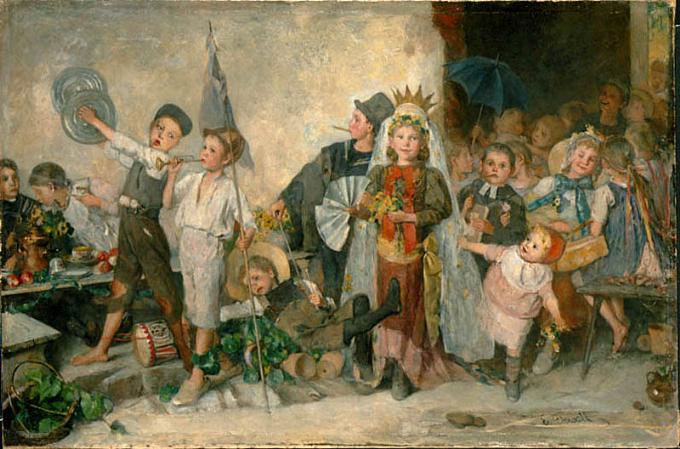
Downtime is one of the less appreciated additions of the Tales of the Valiant RPG to the 5E space. Downtime creates a playtested, workable, fun system for your character to have a life when they’re not going down holes in the ground. The Player’s guide contains five common downtime activities, including researching, training, and the ever-popular carousing.
But there’s no way that list is exhaustive. Here are two new downtime activities for your more pious characters!
Religious Services
You can spend downtime doing holy works, volunteering for a local temple or going directly to wherever the sick and infirm dwell. You don’t need any specific materials to do this, although if you want perform this activity under the auspices of an religious organization, a friendly relationship with the local clergy of a god you worship will be a big help. If the organization is large enough to be a faction, performing religious services under their supervision might modify your status with them, at the GM’s discretion (see Factions in Game Master’s Guide).
Choose one of the following activities:
- Providing Healing. This entails distributing healing (via magic or mundane means) or providing spiritual counseling to those in need.
- Performing Religious Rites. Common religious rites include officiating wedding ceremonies, conducting funeral rites, presiding over birth or coming of age ceremonies, and initiating a creature into your faith.
- Proselytizing. Spreading the word of your religion is a common activity for faiths with a goal of increasing worshippers.
Time. To complete this activity, a PC must spend at least one week of downtime. A PC must have the necessary background, standing within a religious hierarchy, and/or class features to gain any reward from performing these tasks.
Cost. For each week of downtime spent providing religious services, a PC must spend at least 10 gp to cover expenses. This cost represents materials for rites, proper vestments, medical supplies (such as bandages and ointments), the production of proselytizing literature, and similar expenses. The GM might also require the PC to pay a tithe to their god, which can be up to 10% of their material wealth.
Resolution. At the end of each week spent providing religious services, a PC makes an INT (Religion) check to determine how pleased their god was with their works, as shown on the Religious Services Resolution table.
Religious Services Resolution
| CHECK RESULT | RESOLUTION |
| 1–5 | Your god doesn’t acknowledge your efforts, perhaps seeing them as insufficient. |
| 6–10 | Your god is pleased with your works, but offers no reward. |
| 11–15 | You gain a boon: After you finish a short rest, you can recover one expended 1st-circle spell slot. |
| 16–20 | You gain a boon: After you finish a short rest, you can recover two expended 1st-circle spell slots. |
| 21+ | You gain a boon: You gain an additional use of your Channel Divinity feature. Alternately, after you finish a short rest, you can recover three expended 1st-circle spell slots. You choose when you are awarded this boon. |
Boons. You can have only one boon at a time, and it lasts until expended. If you already have a boon when you receive one, you choose which one you keep. If your PC cannot benefit from one of the possible boons, work with your GM to devise an alternative.
Philanthropy
You can spend downtime doing good works around a community, such as performing acts of service, donating your time and money, or using your expertise to help build systems that can be used to benefit all.
Time. To complete this activity, a PC must spend at least one week of downtime.
Cost. For each week of downtime spent doing philanthropic works, a PC must spend at least 100 gp to cover expenses. This cost represents donations or endowments, materials for building or rebuilding structures, materials to feed and clothe the poor, and similar expenses. Depending on the scope of the projects the PC wishes to fund, the GM might also require an amount equal to 10% or more of their material wealth.
Resolution. At the end of each week spent doing philanthropic works, make a CHA (Persuasion) check to determine how much the PC’s efforts helped, as shown on the Philanthropy Resolution table.
Philanthropy Resolution
| CHECK RESULT | RESOLUTION |
| 1–5 | Your well-intentioned efforts to help only made things worse. Lose 1 Luck. |
| 6–10 | The community is grateful for your support, but your efforts seem to have had little impact. |
| 11–15 | The community sees noticeable improvement. You gain 1 Luck. |
| 16–20 | Life is significantly improved for those you helped. You gain 2 Luck. |
| 21+ | Your efforts were a transformational event for your chosen community. You gain 3 Luck. |
Gaining and Sharing Luck. If you gain Luck from this downtime activity, you can share any amount of your Luck total with any willing creature you converse with for at least 10 minutes. If the Luck you receive would cause you to exceed the 5 Luck maximum, your Luck total does not reset, but you must distribute any excess Luck until you have no more than 5. If you do not share excess Luck within 8 hours of completing this downtime activity, you must roll a d4 and reset your Luck total to the number rolled.
